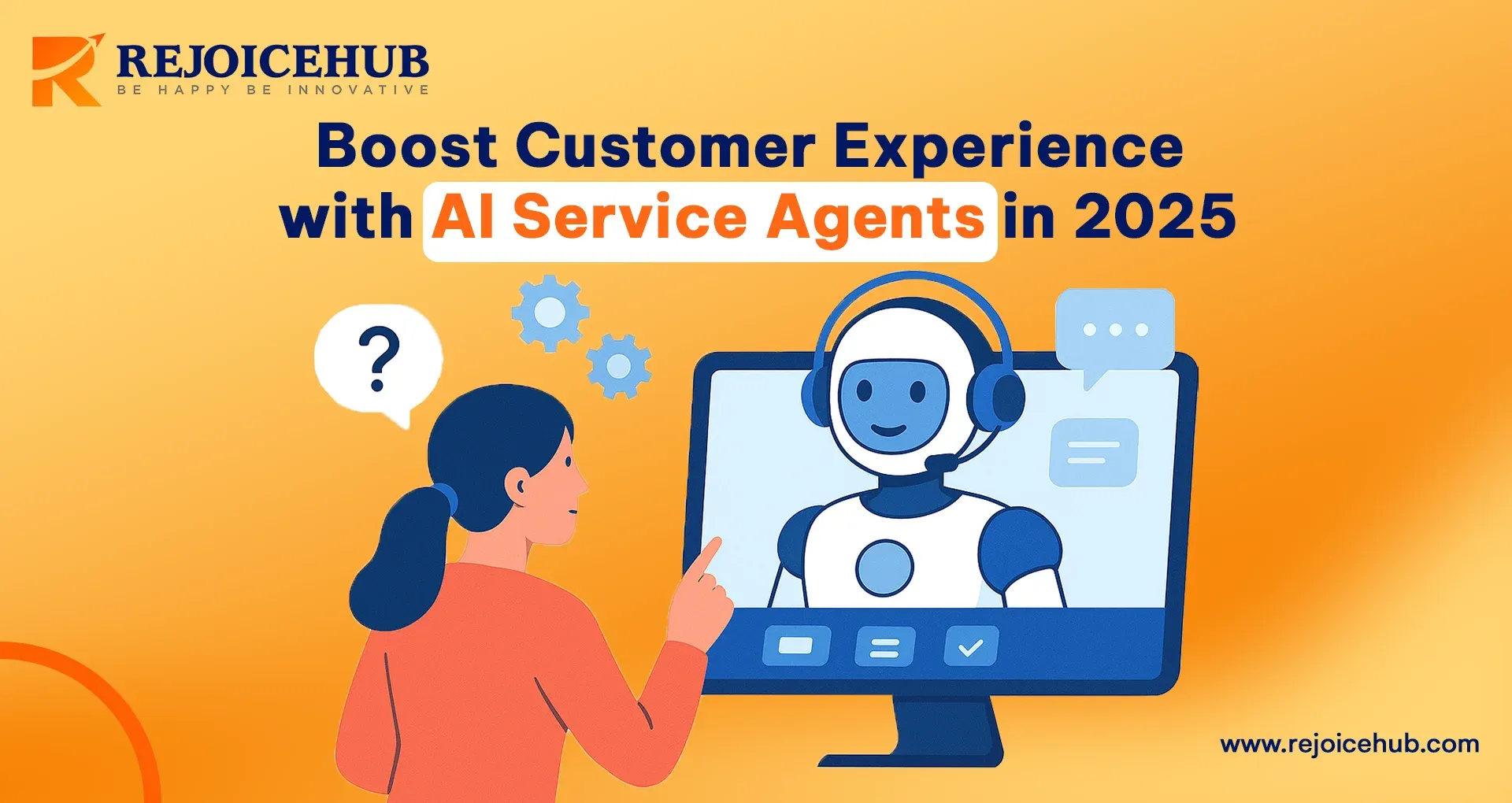
If you were born before 2000, then you too must have waited in line for hours for a normal query or enquiry in government offices or banks, because then there was neither calling customer support nor online customer support, but today in 2025, AI service agents have arrived, who are so advanced that they can solve dynamic problems starting from normal enquiry and this is the reason that in 2024, 49% of USA adults have used AI customer service many times and everyone's feedback and experience is much better.
Due to AI Service Agents, today's customer support sector has become quite instant and personalized, be it through email, live chat, social media, or even voice calls. Today's businesses have become so large that it is not possible to manage them with human customer support; that is why they want to deploy AI Agents in their businesses, but are quite confused as to how they can do it.
And in today's detailed article, I will clear all your doubts regarding AI Service Agents, and we will know how it helps in businesses and how you can deploy it effectively.
Quick Summary
Today's AI customer service agents are much better than normal chatbots, as they have become a kind of intelligent digital worker who can interact in real-time across different channels and can resolve complex issues. It also helps human customer service staff a lot in tackling large queries.
Our Focus in this article:
1. What are AI customer service agents, and how do they work?
2. Why is the demand for AI customer service agents increasing so much, and what is the benefit of using it in businesses?
3. What are the challenges in deploying AI agents, and how can we do it effectively?
4. What is the future of AI Agents going to be like?
What are AI Customer Service Agents?
Let us understand AI customer service in detail, what it is and what its core components are.
Defining AI Customer Service Agents
If we understand AI customer service agents in simple words, then it is a kind of digital assistant, which uses advanced technology like NLP (Natural Language Processing) and automation. Old Chatbots used to respond only according to a single script, but these AI service Agents are dynamic, due to which they can think, learn and act autonomously.
Here’s the big difference
- A chatbot = Traditional chatbots had a fixed FAQs script, due to which they used to give fixed answers.
- An AI agent = can understand the intent of the customer and reply to the customer according to business data by analyzing past interactions, and its reply is also dynamic because it has access to real-time data of the company.
Today's AI agents can also easily handle multimodal interactions, be it text or voice. And it can handle WhatsApp messages, email, or even a voice call simultaneously. The most special thing about it is that it understands the intent of human language and replies.
In short, the main goal of AI customer service agents is not to replace human agents, but its main goal is to enhance the customer experience even more.
Core Components and Capabilities
Let us go into detail about the core components and capabilities of AI agents
-
Natural Language Processing (NLP) and Understanding
It is because of NLP that these AI agents understand the language of humans and are able to answer them. I have tested Advanced AI agents many times, and I have noticed that they not only try to understand the intent of the customer on a query but also try to detect the tone and sentiment.
For example, if it feels that a customer is very frustrated, then it will try to talk to the customer as politely as possible and solve their issue effectively.
And because of this human-like approach, these AI agents can enhance the customer experience even more. They support multiple languages, which is why they can handle customers 24/7 globally.
-
Machine Learning and Adaptation
Traditional bots were static, but AI agents continuously learn and get smarter with every interaction. Because it recognizes and analyzes behaviour patterns, AI agents are able to give such personalized results.
For example: If you order a lot of gadgets, then AI agents can offer you their accessories or warranty extensions.
-
Integration and Orchestration
Advanced AI agents do not work in isolation, but they can integrate with business CRMs, knowledge bases, ERPs, and workflow tools, making them very easy to handle.
-
It can provide real-time order details from the database.
-
It can easily check refund tickets or service tickets from ERP.
-
It can automatically update CRM records.
-
It can also orchestrate workflows, that too without human help.
-
Evolution from Traditional Customer Service
Let's understand the traditional customer service workflow, as this will help us understand more about the evolution of today's AI agents.
-
Customer service has evolved massively
-
Past: Earlier, there were IVR systems in which you had to press 1,2,3 on your keypad phone according to customer service, and I have used this a lot in 2010.
-
Then, after that, basic Chatbots came in, which you could ask FAQs, and these were mostly popular in banks and e-commerce sectors.
-
Now (2025): Today’s AI agents work with memory, reasoning, and action. Therefore, advanced agents are able to deliver personalized results.
Whichever industry has adopted AI agents, they have seen a lot of acceleration in customer service, and according to IBM and Salesforce research, leading companies are already rapidly deploying AI agents from retail, healthcare, to financial services.
This is why AI agents are becoming so useful, because they do not work reactively but like proactive partners. AI agents find the solution to the problem before it even occurs.
How Do Customer Service AI Agents Work?
So let's know how AI service agents work, you can understand AI agents as a three-layered system in which input, intelligence, and output are most important. These three layers together make AI agents so capable that they can understand the customer's query and then answer it in real time.
Technical Architecture and Components
Let's understand the technical architecture and components of AI Agents.
1. Input Processing Layer
In the first step, AI agents listen to the customer's input; for this, they collect data in the format of multiple channels like chat, email or voice.
After this, the AI agent instantly detects the customer's language, be it English, Hindi, or a mix.
After this, it extracts the real context from the message; for this, it uses natural language processing. And this ensures that AI agents not only listen, but also understand the meaning of the query.
2. Intelligence Engine
This is the brain of the AI agent, which uses advanced algorithms to answer according to the context.
- Intent classification: In this, the AI agent figures out what the customer ultimately wants.
- Entity recognition: In this step, the AI agent analyzes basic details like names, dates, and order numbers.
- Decision-making: It uses decision trees or reasoning models (like Salesforce’s Atlas Reasoning Engine) to decide the next step, whether to answer directly or to manage the workflow.
- Knowledge integration: The AI agent connects to FAQs, product manuals, CRM data, or ERP systems based on the query so that accurate information can be collected in seconds.
This is why AI agents are more advanced and smart than traditional bots.
3. Output and Action Layer
After this, AI finally takes action; for this, it uses its action layer.
- First of all, it generates a personalized response.
- After this, it executes a task like issuing a refund or scheduling an appointment.
- It also triggers workflows like sending a confirmation email.
- If there is any issue that the AI agents are unable to solve, then it send the complete customer history and information to the human representative. This helps the human representative a lot to respond quickly.
The most special thing about AI agents is that they not only respond, but also track the user's performance, analyze the results and adjust for the next time.
Workflow and Process Flow
Let's understand the customer interaction lifecycle:
1. Initial Contact: First of all, the customer types or calls, and according to that, the AI agents understand the context and instantly start talking to them.
2. Query Analysis: After this, the AI does a breakdown according to the request and checks the customer's history.
3. Information Gathering: After the conversation, the AI agent processes order IDs, account details, or asks clarifying questions.
4. Solution Delivery: After understanding the context, it provides a resolution to the customer or after, it executes the task.
5. Follow-Up: Finally, AI agents send confirmations and survey requests or reminders to the customer.
On the backend, the AI simultaneously
- Updates the database in real-time based on queries.
- It then interacts with 3rd-party apps (e.g., Slack or Salesforce).
- Generates necessary documents like invoices based on the conversation.
- AI agents try to save compliance records and audit trails in their system.
- This tight workflow ensures accuracy, speed, and compliance without human micromanagement.
Learning and Improvement Mechanisms
Modern AI agents are not static; hence, they are continuously learning and improving.
- Feedback loops: AI agents are trained in such a way that they regularly take customer satisfaction surveys or feedback so that they can improve themselves.
- Performance monitoring: After this, the AI system tracks metrics like resolution time or CSAT scores.
- Model retraining: AI keeps updating itself with fresh data so that it gives accurate results.
- Quality assurance: Audits on the basis of business interactions so that it can match brand voice and compliance needs on the basis of responses.
From my experience, this is the self learning ability, due to which AI agents become future-proof. This is not like a simple tool or a chatbot; rather, it is a digital self-growing team member.
Why Are AI-Powered Customer Service Agents Important?
If you’ve ever waited 40 minutes or more on a customer service call, you know how frustrating it is. In 2025, customers will no longer accept this kind of service. They want fast answers, personalized attention, and a consistent experience every time. If businesses don’t provide these good features, they may lose their customers. This is why AI-powered customer service agents are no longer a “nice to have” but a must-have for every business.
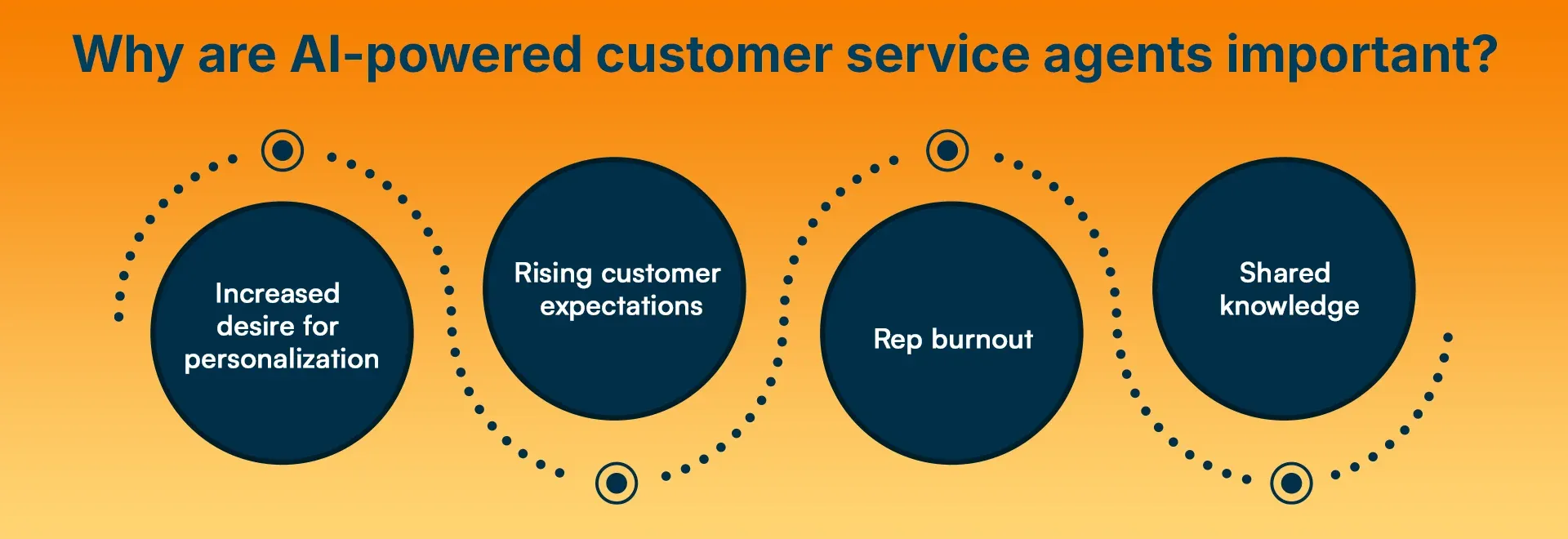
1. Market Drivers and Business Imperatives
-
Increased Desire for Personalization
Today’s customers want companies to treat them like human beings, not just a ticket number. Research shows that 65% of customers want businesses to change to suit their needs. AI agents make this easier. They provide personalized support by looking at past interactions, purchases, and browsing history. For example, if I frequently order electronics, AI can not only help with late deliveries but also suggest warranties or accessories that may be useful to me.
2. Rising Customer Expectations
Today's world is very fast. Just like Netflix, Amazon, or food delivery apps offer instant convenience, people expect instant help from customer service:
- Instant replies (no waiting in line).
- 24/7 availability (not limited to office hours).
- Same experience everywhere (whether chat, email or phone).
- AI service agents do all this with ease and are available to help around the clock.
3. Representative Burnout and Retention Issues
The truth is that customer service jobs are not easy. Employees have to answer the same questions over and over again, handle angry customers and always work under pressure. This is why 56% of service representatives experience burnout. This results in people quitting, frequent hiring and poor service quality. AI agents ease this burden by taking over repetitive tasks. This allows human employees to focus on more important and emotional interactions where their real skills come into play.
4. Shared Knowledge and Consistency Needs
In the traditional approach, information is often inconsistent. One agent may answer something and another something else, leaving customers confused. AI solves this problem by having a centralized knowledge base that ensures every answer is accurate and consistent. Over time, AI can also create new articles on its own and keep the system constantly updated.
5. Strategic Business Impact
-
Competitive Advantage Through Superior Service
In crowded markets, the biggest difference is seen through good service. Companies that use AI agents are able to provide fast, intelligent and personalized service to customers. This keeps customers happy, keeps them engaged for a longer time and also improves the company's image.
-
Operational Transformation
AI agents not only improve service but also change the entire way of working. They make the work process uniform, make proper use of resources and can handle work on a large scale without increasing staff. For example, a company that earlier needed 100 agents, now the same work can be done by 60 agents and AI together. This saves money, and the company can invest that money in future work. Along with this, customer service also remains good, no matter how much work pressure there is.
-
Data-Driven Decision Making
Every time AI interacts with a customer, it generates data, such as customer behaviour, likes and dislikes, and what problems are occurring most often. This data is extremely valuable. Companies can use it to improve their products, find bottlenecks, and anticipate customer needs. For example, if many people complain about a feature, the company can fix it in time. This will reduce complaints and keep customers happy.
In short, AI service agents are important because they solve three big problems at once: rising customer expectations, employee burnout, and the need to provide consistent and reliable service across all platforms. And they not only solve problems, but also provide opportunities for growth and recognition.
Also read: Transform Your Customer Support with AI Automation
Benefits of Using AI Agents for Customer Service
When I first started testing AI service agents in real-world workflows, I realized something quickly: they aren’t just about “faster responses.” They completely reshape how businesses operate and scale support. Let’s break down the benefits into clear categories: operational, financial, strategic, and customer experience.
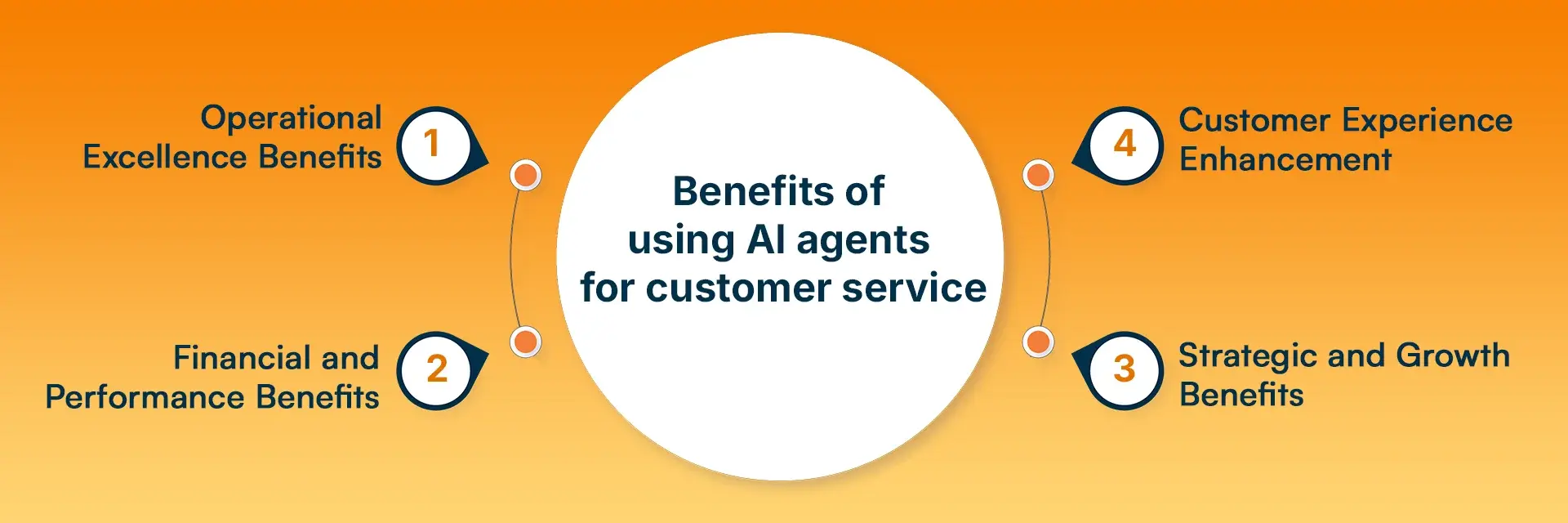
1. Operational Excellence Benefits
-
24/7 Availability and Instant Response
-
Unlike human teams, AI agents never sleep, take breaks, or call in sick. They provide round-the-clock service, covering:
-
Global time zones effortlessly.
-
Peak-hour traffic without long wait times.
-
Holiday and weekend service (which customers increasingly expect).
For example, if a customer in New York messages at 2 AM while another in Tokyo calls during business hours, the AI agent handles both instantly, with no delays no fatigue.
-
Omnichannel Support Integration
Today’s customers jump between channels: email, WhatsApp, phone, and social media. AI agents provide a seamless, consistent experience across all platforms. They preserve context, too. If a customer starts with a WhatsApp query and later calls, the AI (or human agent) already knows the history, so the conversation feels continuous.
-
Improved Human Agent Interaction
-
AI doesn’t replace human agents; it makes them better. Here’s how:
-
Routes cases intelligently, ensuring the right human rep gets the right query.
-
Provides context and a briefing when escalating an issue, so agents don’t waste time repeating steps.
-
Optimizes workload distribution, preventing burnout.
-
Supplies agents with productivity tools (like suggested responses or auto-filled forms).
In practice, this means human reps spend more time solving complex, high-value issues instead of answering “Where’s my order?” 50 times a day.
2. Financial and Performance Benefits
-
Reduced Operational Costs
These AI service agents have brought about a lot of transformation in the financial sector, due to which loan companies make 70% fast credit decisions on whether a loan should be given to a person or not.
- Staffing needs for routine queries.
- Training and onboarding expenses.
- Infrastructure costs tied to big support centres.
For instance, a major shipping company cut onboarding paperwork time from 4 hours per week to just 30 minutes using AI agents, a huge cost and time saver.
-
Reduced Customer Response Time
Speed is everything in customer service. AI agents instantly acknowledge queries, handle simple issues in seconds, and route complex ones efficiently. This:
-
Shortens queue lengths.
-
Increases first-contact resolution rates.
-
Reduces frustration, since customers don’t have to repeat themselves.
-
Improved Operational Efficiency and Productivity
AI agents can juggle hundreds of conversations simultaneously, something impossible for human reps. They automate ticket creation, update CRMs, and handle repetitive workflows, which means your human agents are freed up to focus on strategic or creative tasks.
3. Strategic and Growth Benefits
Data-Driven Insights and Analytics
-
Every customer interaction becomes a data point. AI agents analyze patterns like:
-
What customers complain about most.
-
Which products drive the most support requests?
-
How sentiment shifts over time
This helps businesses act proactively. For example, if AI agents detect negative sentiment around a product feature, leadership can fix it before it becomes a brand reputation issue.
-
Unlimited Scalability
Human teams cannot work 24x7, and there are limitations in the human workforce, but there is no such limitation in AI agents. They can easily scale businesses and can also easily handle Multimodal agents different operations without any extra monetary burden. Due to this, businesses do not have to compromise on their service quality and are able to fulfil those demands as well.
-
Faster Market Expansion
Want to launch in a new country? AI agents can provide multi-language support without requiring massive hiring. This accelerates expansion while keeping service consistent globally.
4. Customer Experience Enhancement
Finally, the benefit that matters most, happy customers. AI agents improve CX by:
- Delivering personalized service tailored to each customer.
- Maintaining consistent quality across all interactions.
- Proactively identifying and resolving issues before they escalate.
- Boosting customer satisfaction scores (CSAT).
Take the example of Camping World: after integrating AI agents, customer engagement jumped 40% while wait times dropped from hours to just 33 seconds. That’s the kind of impact customers notice.
Bottom line: AI service agents don’t just save money, they create better experiences, loyal customers, and empowered employees. That’s why businesses across industries are racing to adopt them in 2025.
Use Cases for AI Agents in Customer Service
One of the best ways to understand the power of AI service agents is to see them in action. Over the last few years, I’ve tested these tools in different scenarios and studied how businesses implement them. What’s clear is this: AI agents aren’t just answering FAQs; they’re managing end-to-end processes, guiding customer journeys, and even predicting problems before they occur.
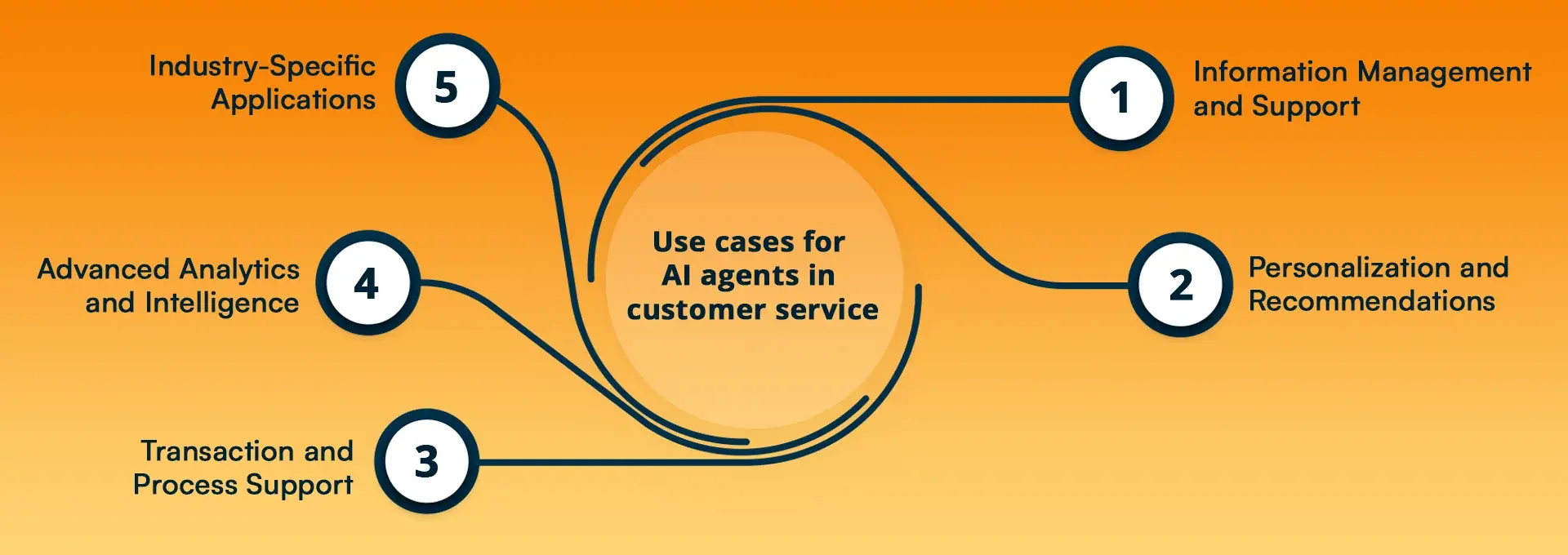
1. Information Management and Support
-
Knowledge Management and Data-Driven Insights
AI agents act as knowledge librarians for both customers and human reps. They instantly search knowledge bases, update records, and cross-reference multiple data sources to give the right answer at the right time. Unlike static knowledge portals, AI agents keep learning, meaning fewer outdated answers and faster responses.
Example: A telecom company can use AI agents to analyze repeated queries about slow internet speeds. Instead of reps handling each ticket individually, the AI can spot patterns, provide solutions instantly, and even alert engineers about potential network-wide issues.
-
Addressing Customer Queries
This is the most important capability of AI agents. Whether it’s “Where’s my order?” or “Can you help reset my password?”, AI agents handle simple to complex queries with contextual accuracy.
- FAQ automation: Goes beyond scripted answers; responses adapt based on customer history.
- Complex query breakdown: For instance, if a customer writes a long complaint mixing billing, delivery, and product issues, the AI separates them into sub-tasks and routes them properly.
- Historical context: AI remembers previous interactions, so customers don’t have to repeat themselves.
2. Personalization and Recommendations
-
Personalized Recommendations and Support
This is where AI feels almost like a personal concierge. By analyzing usage patterns, purchase history, and behaviour, AI agents can:
-
Suggest complementary products.
-
Offer tailored service upgrades.
-
Send proactive reminders (e.g., insurance renewals, subscription expiry).
-
Customer Journey Optimization
AI agents don’t just solve problems, they guide customers through their journey:
- Onboarding: Explaining features and helping with setup.
- Education: Teaching customers how to get the most from a product.
- Usage optimization: Nudging customers toward underutilised features.
- Lifecycle engagement: Providing the right message at the right time (welcome notes, upgrade offers, loyalty perks).
3. Transaction and Process Support
-
Order Status and Tracking
Instead of calling a helpline, customers can ask the AI: “Where’s my order?” The agent pulls data from shipping APIs and gives real-time updates. It can even factor in traffic or weather conditions to adjust delivery expectations.
-
Process Automation
AI agents excel at repetitive but essential processes:
- Account setup & configuration.
- Document verification (ID checks, policy documents).
- Service activation.
- Compliance workflows (ensuring every step is logged for audits).
In my own experiments, automating just account verification alone saved hours of manual review time every week.
4. Advanced Analytics and Intelligence
-
Identifying Customer Sentiment
AI agents don’t just process words; they read emotions. With sentiment analysis, they detect frustration, excitement, or confusion in real time. If a customer shows signs of anger, the AI can escalate to a human before things spiral.
-
Troubleshooting and Technical Support
AI agents act like virtual technicians:
- Guiding customers through diagnostic steps.
- Pulling error logs from devices (in IoT contexts).
- Offering step-by-step repair instructions.
- Handing off to a human engineer when needed, with all context attached.
5. Industry-Specific Applications
-
Retail and E-commerce
-
Product comparisons and size guidance.
-
Real-time inventory checks.
-
Simplified returns and refund automation.
Result: Faster shopping support = fewer abandoned carts.
-
Financial Services
-
Balance checks and transaction tracking.
-
Fraud detection and alerts.
-
Personalized investment advice.
-
Compliance with regulations (e.g., explaining new policies clearly).
Banks are using AI agents to handle millions of daily queries securely and consistently.
-
Healthcare and Insurance
-
Appointment scheduling and reminders.
-
Insurance claim status updates.
-
Coverage details and policy explanations.
-
Preventive health nudges (e.g., reminders for annual checkups).
For patients, this means less paperwork and faster access to care.
The beauty of AI agents is flexibility. Whether it’s e-commerce, finance, or healthcare, they adapt to specific workflows while keeping the customer at the centre.
Also Read: What is Context Engineering in AI? A Complete Guide for 2025
Best Practices for Using AI Agents in Customer Service
Having worked with AI-powered service solutions, one thing I’ve learned is this: technology alone isn’t enough. The success of AI service agents depends on how you deploy, train, and integrate them. Businesses that rush into AI adoption without a proper strategy often struggle with poor outcomes, while those that follow best practices see measurable ROI and happier customers.
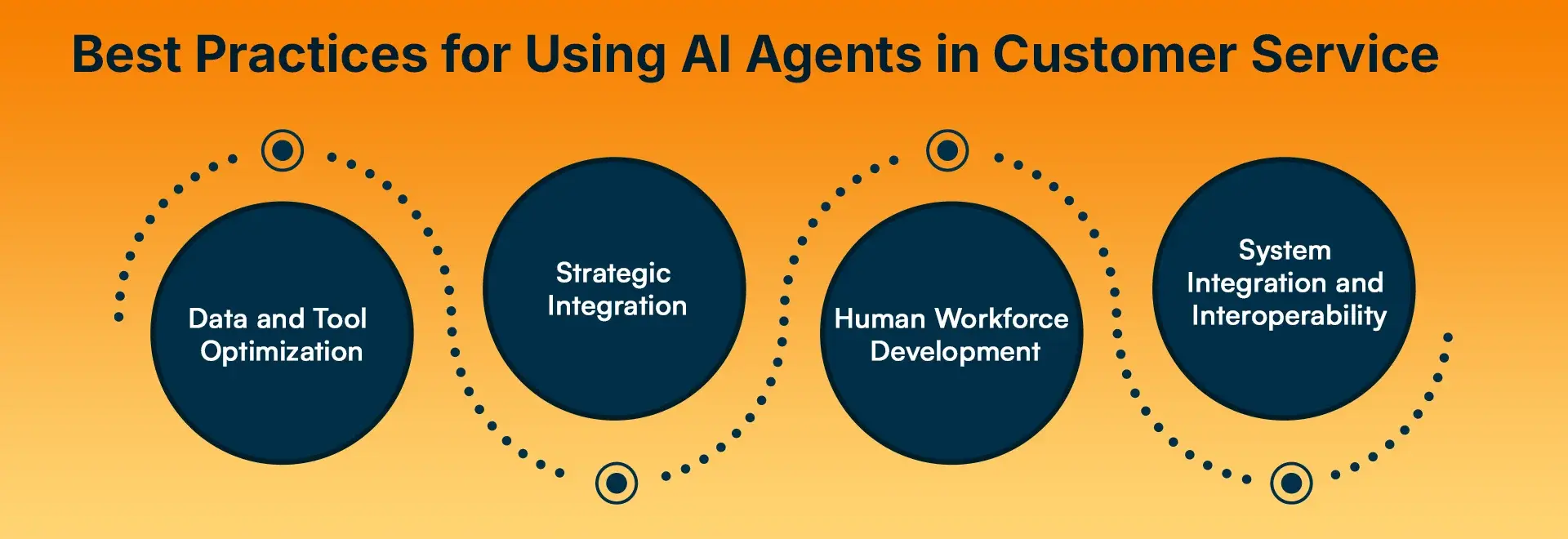
1. Data and Tool Optimization
-
Providing AI Agents with Appropriate Data and Tools
AI is only as smart as the data it has. To get accurate, helpful responses, businesses must:
- Train agents on clean, high-quality data.
- Connect them with real-time sources (like CRMs, ERPs, or shipping databases).
- Equip them with APIs to access key systems.
- Ensure security and privacy compliance (GDPR, CCPA, HIPAA, where applicable).
I’ve seen companies neglect data hygiene and then blame the AI for errors, when in reality, the problem was bad input data. Clean data = accurate AI.
-
Knowledge Base Management
Your knowledge base is the AI’s brain. It should be:
- Audited regularly to remove outdated info.
- Optimized for multiple formats (articles, videos, infographics).
- Version-controlled, so updates don’t break workflows.
- Monitored for performance (which answers are used most, which fail).
2. Strategic Integration
-
Integrating AI into a Broader Customer Engagement Strategy
AI agents shouldn’t be a siloed add-on. They need to align with the overall CX strategy. That means:
- Mapping the entire customer journey and identifying where AI adds value.
- Ensuring responses reflect the brand voice.
- Integrating AI into sales and marketing funnels, not just support.
For example, an AI service agent can resolve an issue and upsell a product upgrade during the same interaction.
-
Channel Strategy and Deployment
Instead of rolling out AI everywhere at once, start small:
- Test in one or two channels (say, web chat + WhatsApp).
- Gather customer feedback.
- Expand gradually while fine-tuning responses.
- This phased approach prevents large-scale failures and builds customer trust.
3. Human Workforce Development
-
Upskilling Human Agents
AI doesn’t replace people, it changes their roles. Support teams should be trained in:
- Collaborating with AI agents.
- Using AI insights to handle complex cases.
- Building emotional intelligence for conversations where empathy is key.
I’ve noticed that when agents see AI as a partner, not a threat, adoption skyrockets.
-
Role Evolution and Career Paths
AI transforms customer service roles into more strategic careers. Agents move from answering repetitive queries to handling escalations, analyzing data, and managing CX strategies. Businesses should support this shift with new training programs and career paths.
4. System Integration and Interoperability
-
Integrating Agents with Enterprise-Wide Systems
The real magic happens when AI connects to all core systems:
-
CRM is used for customer history.
-
ERP is used for order, billing, and inventory data.
-
Communication platforms are used for seamless conversations.
-
Analytics dashboards are helpful for real-time performance monitoring.
-
Technical Infrastructure Requirements
Before deployment, ensure:
- Scalable cloud architecture.
- Strong data privacy and security protections.
- High system uptime and reliability.
- Backup & disaster recovery plans.
Think of it like building a house: without a strong foundation (infrastructure), your AI agents won’t perform reliably.
In short, successful AI adoption requires clean data, clear strategy, human alignment, and robust systems. Follow these practices, and AI agents won’t just be tools, they’ll become your competitive advantage.
Why Choose Agentforce Service Agent as Your AI Customer Service Agent Solution
There are dozens of AI-powered customer service platforms out there, but not all are created equal. From my experience with different tools, Agentforce Service Agent (from Salesforce) consistently stands out because it’s not just a chatbot framework, it’s a full-fledged AI service ecosystem designed for enterprise-grade performance. Let’s break down why it’s a strong choice.
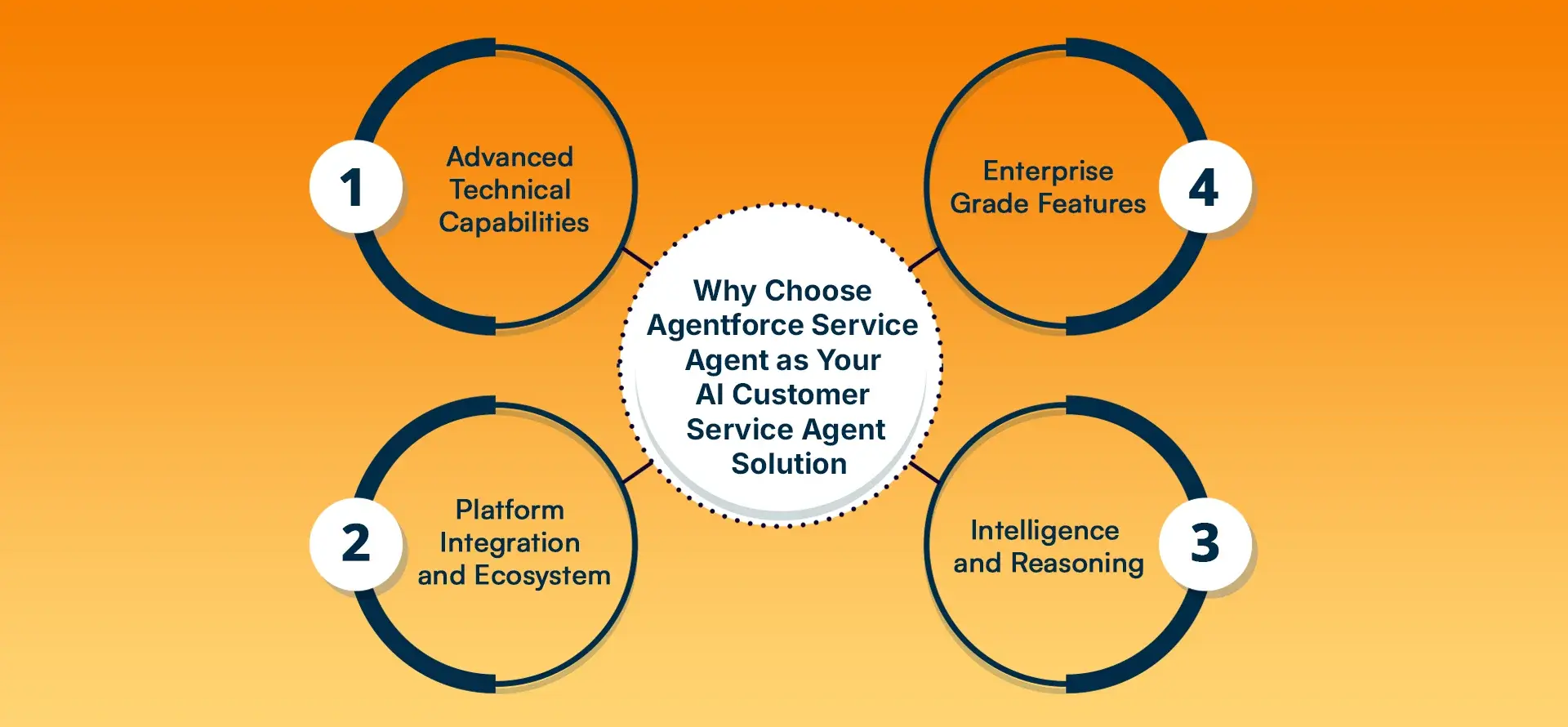
1. Advanced Technical Capabilities
-
Multi-Modal Understanding
Agentforce doesn’t limit itself to text, it processes voice, text, and even visual inputs. That means customers can interact however they feel comfortable, whether it’s typing on WhatsApp, speaking into a phone call, or even uploading an image for clarification. The AI then combines these inputs to understand context holistically. For customers, this feels natural and human-like.
-
Multi-Channel Support
Customers today don’t stick to one platform. Agentforce connects seamlessly across SMS, WhatsApp, Facebook Messenger, web chat, and voice calls. More importantly, it maintains context when customers switch channels. So if someone starts on email and later calls, the AI knows the history and continues smoothly, something traditional systems can’t do.
2. Platform Integration and Ecosystem
-
Agent Builder
One of my favorite features is the low-code Agent Builder. It allows teams to create and customize AI agents without needing deep coding expertise. You can:
- Define tasks and workflows.
- Use drag-and-drop prompts or templates.
- Connect APIs and third-party tools.
- Test and refine agents quickly.
This gives business users (not just IT teams) the power to tailor AI agents for specific use cases, which means faster deployment and iteration.
-
Service Cloud Integration and Interoperability
Because it’s built on Salesforce, Agentforce naturally integrates with the entire Salesforce ecosystem, including Service Cloud and Data Cloud. This enables:
- A 360-degree view of the customer.
- Automatic syncing of records.
- Easier collaboration between AI and human reps.
- Workflow automation within the same environment.
In short: it works with the tools companies are already using.
3. Intelligence and Reasoning
-
Atlas Reasoning Engine
The real magic of Agentforce lies in its Atlas Reasoning Engine. Unlike simple AI systems that just follow decision trees, Atlas can:
- Analyze queries contextually.
- Break them into smaller tasks.
- Plan and execute multi-step resolutions.
- Adapt responses over time through learning.
This means Agentforce feels less like a script-following bot and more like a thinking partner that actually solves problems.
-
Product Data Integration
With Data Cloud integration, the AI can pull real-time product info, like availability, pricing, and compatibility. This enables advanced features such as dynamic recommendations, cross-selling, and upselling during support conversations.
4. Enterprise-Grade Features
What makes Agentforce enterprise-ready is its scalability, compliance, and support. It offers:
- Strong security certifications and privacy compliance (GDPR, HIPAA, etc.).
- Guaranteed uptime and performance.
- Professional support and consulting services.
- Built-in ROI tracking and analytics.
For large organizations, these aren’t optional, they’re essential. Agentforce delivers on all fronts, making it a reliable long-term solution.
In short: Agentforce isn’t just another AI tool. It’s a robust, enterprise-ready customer service platform that combines multi-channel engagement, deep integration, advanced reasoning, and strong compliance, all while being easy to deploy and scale.
Future of AI in Customer Service
As impressive as AI agents are today, we’re only scratching the surface. Between 2025 and 2030, customer service is going to undergo an even more radical transformation, driven by advances in conversational AI, predictive analytics, and immersive technologies. Here’s what’s on the horizon.
1. Emerging Technologies and Trends
-
Conversational AI Evolution
AI conversations are getting closer to human-level fluency. With large language models becoming more advanced, expect service agents to:
- Simulate empathy and emotional intelligence, not just provide factual answers.
- Use voice synthesis to sound natural, with regional accents and tone adjustments.
- Translate languages in real time, making global service seamless.
Imagine calling support in Hindi, while the agent replies in English, and yet both parties understand each other instantly, that’s where we’re heading.
-
Predictive and Proactive Service
Instead of waiting for issues, AI agents will predict problems before they occur. For example:
- A bank’s AI may detect unusual account activity and proactively flag it.
- A smart home device could alert support before it malfunctions.
- Telecom AI could warn users of potential service outages before they even notice.
This shift from reactive to proactive support will redefine customer trust and loyalty.
2. Industry Transformation
-
Service Model Evolution
Traditional “reactive” support (“Call us if you face issues”) will fade. Instead, businesses will move toward:
-
It provides proactive service delivery.
-
Subscription-based or outcome-driven models where support is bundled into the experience.
-
Community-driven support, where AI moderates and enhances user forums.
-
Self-healing systems, where issues are fixed autonomously without any customer interaction.
-
Technology Integration
New technologies will also shape the service landscape:
- IoT integration: AI will monitor connected devices and resolve issues automatically.
- AR/VR: Customers might use AR glasses for real-time, immersive troubleshooting.
- Blockchain: To verify service authenticity and ensure data security.
- Quantum computing: For solving highly complex customer service workflows at scale.
Market Predictions for 2025–2030
Analysts predict adoption of AI agents will accelerate across every sector, from retail to banking to healthcare. By 2030, it’s likely that most customer interactions will start with AI agents, with humans stepping in only for exceptions. Investments in AI service tech are projected to skyrocket, as companies realize that customer experience is the new competitive battleground.
Conclusion
In western countries the hourly rate of customer or call centre support is $20-$50, hence most companies cannot afford human staff, therefore AI service agents are used in the market for smart management as these AI agents can easily resolve customer queries or issues through mails, chats or even calling, that too on a quite affordable and automation basis due to which your company becomes capable of providing 24/7 customer service.
These AI service agents use NLP or automation, hence their answers are quite insightful and contextual, which significantly increases the customer experience and trust. Nowaday,s it is quite easy to deploy AI service agents. You just have to contact a trusted firm like RejoiceHub, and they analyze your company and suggest the best solution, and help in deployment.
My Recommendation: You must deploy AI service agents in your business, as it gives you a very competitive edge in the long term, which is why the ROI of AI service agents is known to be much better than human staff.
Frequently Asked Questions
1. How do AI customer service agents handle complex customer issues?
AI customer agents use previous customer interaction or the database to solve complex issues, and accordingly try to tackle issues related to order, account, and if the issue is not resolved by the AI agent, then it forwards the issue to Human customer agent along with complete customer interaction record.
2. What’s the ROI of implementing AI customer service agents?
Actually, ROI depends on many factors, such as staffing cost, engineer cost, and software costs. ROI of both small businesses and large-scale businesses is quite different, and proper business auditing is done to know their exact figures.
3. How do you ensure AI agents maintain brand voice and personality?
To maintain brand voice and personality, AI agents need to be effectively deployed. For this, you can train AI agents from your business database or CRMs. This will make the AI agent respond according to your brand.
4. What are the security and privacy considerations?
Businesses may have to face a lot of security and privacy issues while using AI agents. The most common issues are Customer trust, Encryption, Role-based access controls, and auditing errors.
5. How do AI agents integrate with existing customer service tools?
The speciality of Advanced AI Agents is that they can be easily integrated with the company's CRM, ERP, Knowledge Base, and Communication tools like Slack or Teams, due to which the AI agent has complete information of the company, which helps them give a personalized experience to the customer.
6. What training is required for customer service teams?
Customer service teams play a very important role in training AI agents. For this, it is very important that there are AI-underestimated engineers in management to complete the proper training process smoothly. Apart from this, it is very important to give technical basics, soft skills and ongoing learning to AI agents in training.
